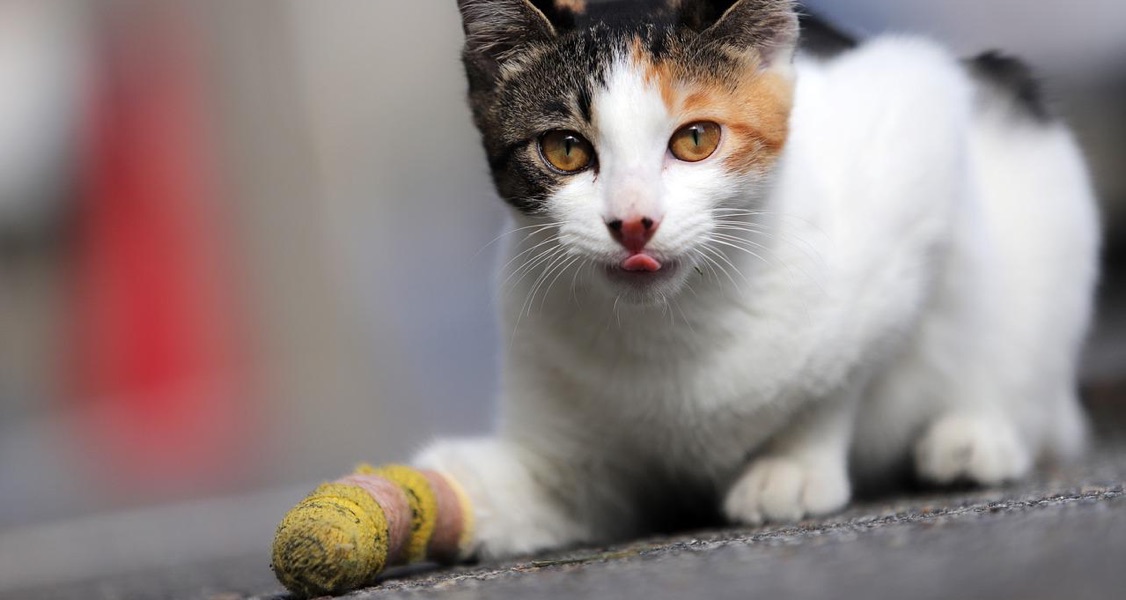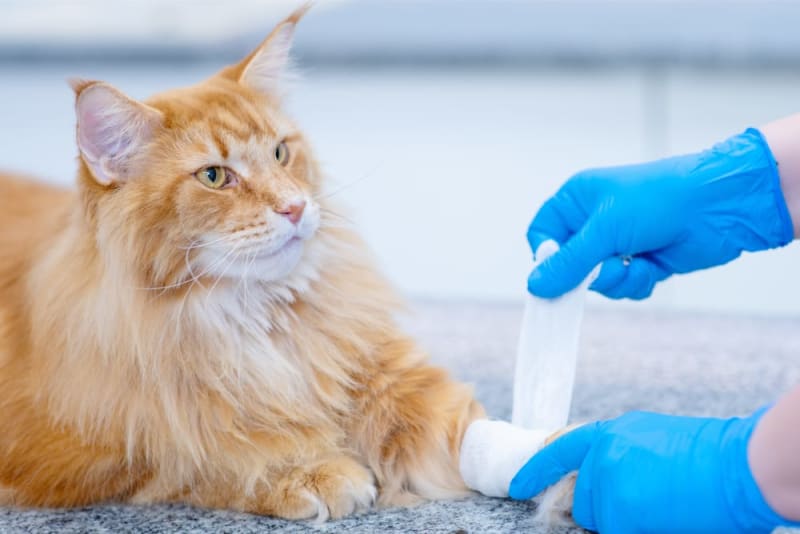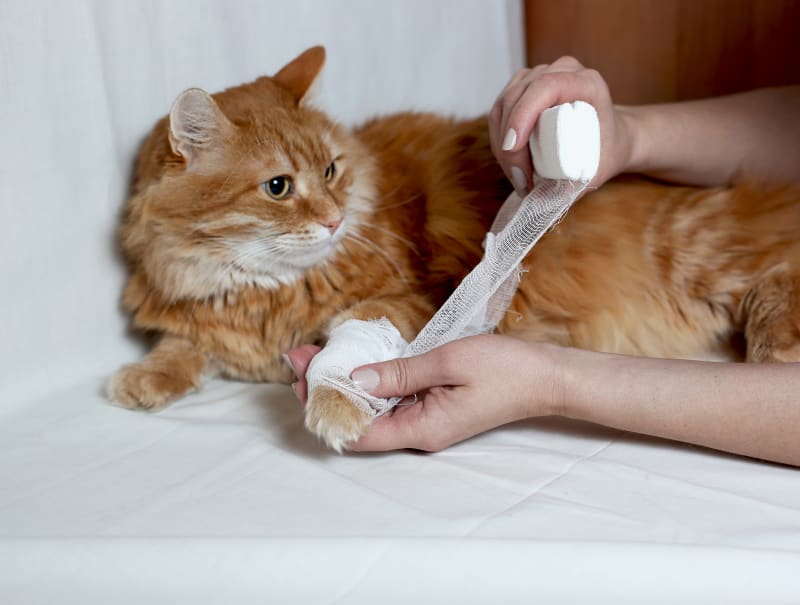
Introduction
When cats get hurt, it can be a scary time for both the cat and the owner. But if you know what to do, you can help your cat heal at home in a safe and calm way. This guide will teach you everything you need to know about cat wound care. It is written in very simple English so that even a child can understand. The goal is to help you take care of your furry friend if they ever get a cut, scratch, or bite.
Cats are curious animals. They love to climb, explore, and sometimes even fight. Because of this, it’s common for cats to get wounds, especially if they go outside. These wounds might look small at first, but they can quickly turn into something worse if not taken care of. That’s why it’s so important to understand how wound care for cats works. You don’t always need to rush to the vet. With the right steps, you can treat many small wounds at home.
Cat wound care means cleaning the injury, keeping it dry, and stopping any infection. You also want to keep your cat from licking or scratching the area. Cats may try to clean their wounds with their tongues, but that can make it worse. A wound that is not cared for properly can swell, get red, or start leaking fluid. That’s why learning simple wound care tips is very helpful. click here
How Do Cats Get Wounds?
Cats get wounds in many different ways. They may get hurt while playing, fighting, or even by accident while jumping or climbing. If your cat goes outside, it might meet other animals or step on something sharp. Some cats even get wounds from scratching too much because of fleas or allergies. It’s not always easy to see the wound right away, so it’s important to check your cat if they are acting strange.
If your cat is hiding more than usual or licking one spot again and again, it might have a wound. Sometimes, the area may feel warm or swollen. There could also be a bad smell or pus. These are signs that something is wrong. Cats may also limp or stop eating if they are in pain. When you notice these signs, it’s time to check your cat’s body carefully.
Small wounds can usually be treated at home, but deep or very dirty wounds may need a vet. If your cat is bleeding a lot, can’t walk, or seems very sick, go to the vet right away. But for small cuts, scratches, or open sores, you can use this guide to help your cat heal safely and quickly.

First Steps in Cat Wound Care
The first thing to do when you find a wound is to stay calm. Your cat can feel your stress, and that can make it harder to treat them. Gently hold your cat and talk softly. Try to keep them still. If they are scared or moving a lot, you can wrap them gently in a towel with their head sticking out. This makes them feel safe and stops them from scratching you.
Once your cat is calm, look closely at the wound. If there is dirt, hair, or grass in the wound, you need to clean it. Use warm water or a cat-safe wound wash. You can also use a cat wound care spray, but make sure it is made for cats. Human sprays or alcohol can hurt your cat’s skin. Read the label before using any product. A good wound care spray for cats helps clean the area and stops bacteria from growing.
After cleaning, dry the area gently with a clean cloth or paper towel. Do not rub hard. If the wound is bleeding, press a clean cloth on it for a few minutes until the bleeding stops. If it doesn’t stop, it’s best to call a vet. For small scratches or bites, once the wound is clean and dry, you can apply a healing ointment that is safe for cats. Ask your vet for the best product to use.
Keeping the Wound Safe
Once the wound is clean, you need to keep it safe while it heals. Cats love to lick their wounds, but this can make things worse. Licking can remove the healing cream and bring in germs from their mouth. To stop this, you may need to use a cat cone or soft collar. These tools stop your cat from reaching the wound. Your cat may not like wearing it at first, but it will help them get better faster.
Watch the wound every day. Look for signs of healing. The wound should start to close and get less red. If it starts to swell, turn yellow, or smells bad, that means there is an infection. In that case, you need to take your cat to the vet. Cats are very good at hiding pain, so be sure to watch closely for small changes.
Keep your cat indoors while they are healing. If they go outside, the wound can get dirty or open up again. Also, try to keep your cat from jumping or running too much. Too much movement can open the wound again. Give them a quiet and cozy place to rest, and keep them away from other pets during this time.
Using Cat Wound Care Spray the Right Way
There are many sprays made just for cat wounds. These are called cat wound care sprays or wound care sprays for cats. These sprays help clean the wound and kill germs. Some also help stop itching or pain. Using a spray is easy. Just spray a small amount on the wound after cleaning it. Do this once or twice a day or as told on the bottle.
Always check that the spray says it’s safe for cats. Some sprays made for dogs or humans are not safe for cats. Never use hydrogen peroxide or alcohol because they can burn your cat’s skin. A good cat wound care spray will help your cat heal faster and keep the wound clean without hurting them.
Before using any spray or cream, you can ask your vet to recommend a good product. Some sprays also protect the wound with a light film, like a soft cover, to keep dirt out. Using these tools makes at-home care easier and safer for your pet.
Caring for a Cat’s Open Wound at Home
Sometimes, a wound may not close right away. This is called an open wound. Open wounds need special care. You must keep them very clean and dry. Wash the wound gently every day with warm water and apply cat wound care spray or a cat-safe cream. Then let it dry before covering it or letting your cat walk around.
When you are doing cat open wound care, it’s important to make sure your cat doesn’t lay in dirty places. Change their bed cover often and keep their litter box clean. This stops bacteria from getting into the wound. Try to keep the area around the wound dry. Wet skin can slow healing.
If the open wound looks worse after a few days or your cat seems more tired than usual, go to a vet. Some wounds may need stitches or antibiotics. But many open wounds can heal well with gentle, daily care at home.
How Long Does It Take for a Wound to Heal?
The time it takes for a wound to heal depends on how big or deep it is. Small cuts and scratches may heal in a few days. Bigger wounds can take one or two weeks. If you care for the wound every day and keep it clean, your cat should heal faster. Also, keeping your cat indoors and calm helps a lot.
If your cat is older or has health problems, wounds may take longer to heal. Watch the wound closely. If it gets worse or doesn’t improve after a week, call your vet. Also, keep your cat’s nails trimmed to avoid more scratches.
Feeding your cat good food with lots of vitamins can also help the wound heal. Just like people, cats need good food to get better. Make sure your cat drinks clean water too. Staying healthy on the inside helps them heal on the outside.

When to See a Vet
Even though you can treat many wounds at home, there are times when you must visit the vet. If your cat is bleeding a lot, limping badly, or not eating, you should go to the vet. Also, if the wound is very deep, full of pus, or smells bad, a vet will need to treat it. Do not wait too long. The longer a wound is left untreated, the more dangerous it becomes.
Cats who get into fights often need vet care. Bite wounds can get infected deep under the skin. These wounds may look small on the outside but be big on the inside. The vet may need to clean it more deeply or give your cat medicine. Always follow the vet’s advice if they give you creams or pills to use at home.
Your cat’s health is very important. Trust your feelings. If something doesn’t look right, it’s better to be safe and ask for help from a vet.
Final Thoughts on Cat Wound Care at Home
Taking care of a cat with a wound may seem hard at first, but with love and patience, you can do it. The key is to stay calm, keep the wound clean, and make sure your cat is comfortable. Use safe products like cat wound care spray, and keep an eye on the healing process every day. If you follow these simple steps, your cat will feel better soon.
Remember that wounds need care every day, not just once. Healing takes time. Be gentle and give your cat lots of love. Talk to them, pet them, and help them feel safe. Cats can’t tell us how they feel, but they trust us to help them. Your care can make a big difference in how fast they heal.
If you ever feel unsure, don’t be afraid to ask a vet. They are there to help. And always choose products made just for cats. Your little friend deserves the best care possible. With this easy guide, you now know how to give your cat safe and loving wound care right at home.
Need more help or tips for your pet? Feel free to reach out or visit my Pinterest Profile and join a friendly community of cat lovers who share advice, pictures, and more every day!
Frequently Asked Questions (FAQs)
1. What is the best way to treat a wound on a cat at home?
To treat a cat wound at home, gently clean the area with warm water or a cat-safe wound care spray for cats. Dry the wound carefully and apply a healing ointment if needed. Keep your cat from licking the wound by using a cone and monitor the healing daily.
2. Can I use human antiseptic or hydrogen peroxide on my cat’s wound?
No, you should not use human antiseptic or hydrogen peroxide on your cat. These can harm your cat’s skin and slow down healing. Always use products made for cat wound care, like a cat wound care spray that is safe and vet-approved.
3. How do I know if my cat’s wound is infected?
If the wound smells bad, is swollen, has yellow or green pus, or your cat seems tired or in pain, it may be infected. In that case, stop home treatment and take your cat to the vet right away for proper wound care for cats.
4. How long does it take for a cat wound to heal?
Small wounds usually heal within 5 to 7 days. Larger or deeper wounds may take up to 2 weeks. Make sure to clean the wound daily and keep your cat indoors while it heals for better cat wound care.
5. What should I do if my cat keeps licking the wound?
If your cat keeps licking the wound, use a cone or a soft collar to stop them. Licking can cause infection and delay healing. Keeping the wound covered and using a healing spray can also help with cat open wound care.